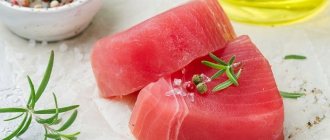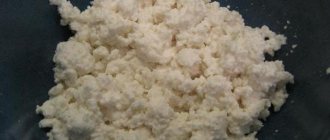What are the benefits of egg white? How much is there in one egg? Is the yolk harmful? What is the best way to prepare this product? Long before the abundance of sports proteins, ordinary chicken eggs were an indispensable source of protein for athletes. Neither meat, nor fish, nor even the revered chicken could provide what the athlete received from proteins and yolks. It is not surprising that since then millions of people have been asking the following questions: how much protein is in one egg, how to cook them correctly, are yolks harmful, etc.
With all the information, you can skillfully include the most easily digestible source of natural protein in your diet, compensating for the lack of proteins without risk to health. But to do this, you need to know not only how many grams of protein are in 1 egg, but also the answers to some other questions.
Ideal protein
Chicken eggs would not be so popular among athletes if it were only the amount of protein they contained. After all, the amount of protein in an egg does not exceed 6-7 grams , and any meat chop will surpass this figure.
But unlike chops, fish and chicken dishes, eggs also have other valuable qualities:
- maximum protein absorption;
- minimum carbohydrates and fats;
- ease of preparation.
Let's look at each item in more detail to evaluate the benefits of the product as part of a regular diet.
Product types and categories
Before you figure out how much protein is in an egg, you need to understand what types of product exist. Often people take packaging without thinking about the subtleties - caring only about integrity. We will go further and figure out what types and categories are currently on store shelves.
Let's start with the view - there are only two of them.
- Dietary (D). The shelf life does not exceed seven days; there is a corresponding red stamp on the shell. The shell is clean, with a small number of dots, the amount of space occupied by air under the shell does not exceed 4 mm;
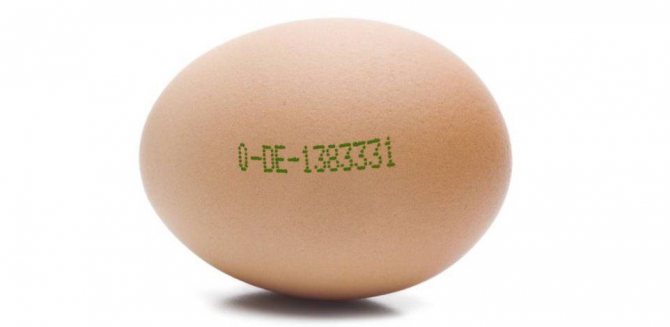
- Dining rooms (C). There is a blue stamp on the shell with the corresponding letter, the amount of empty space is from 5 to 7 mm. The shelf life reaches 25 days outside the refrigeration chamber and 90 days inside it; there may be dots and stripes on the shell (but not more than 12.5% of the total surface area).
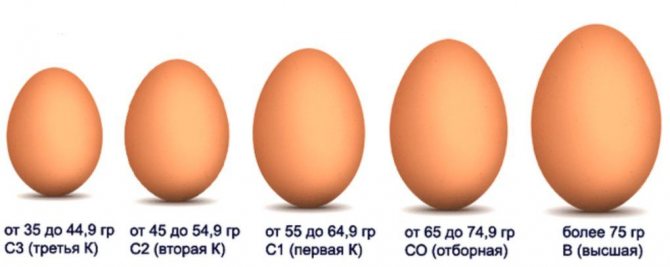
The only difference between them is the shelf life; these are not specific varieties or different products. Most often on the shelves we find a product labeled “C”. Therefore, it’s worth talking separately about possible categories! There are several of them, now you will find out all the necessary information, and then we will talk about how many grams of protein are in one egg.
We also recommend: Where does macadamia nut grow and what does it look like?
Product category is determined by weight! Now you will find out how much protein is in an egg C0 and others:
| Category | Size | Approximate weight (in grams) | Amount of protein (in grams) |
| C3 | Little ones | 40 | 4,4 – 5,7 |
| C2 | Average | 50 | 5,7 – 7,0 |
| C1 | Large | 60 | 7,0 – 8,2 |
| C0 (Selected) | Very big | 70 | 8,2 – 9,5 |
| SV (Higher) | Huge | 75 | 9,5 – 12,7 |
Separately, you can isolate the protein in the yolk of an egg - approximately 2.5 - 3 grams! The rest of the element is contained in the protein shell.
Easy protein absorption
More experienced athletes and professional nutritionists know that it is not the initial amount of a particular element in a product that is important, but the completeness of its absorption. From some types of meat, protein is absorbed only 60% of the original volume, and from plant sources - even worse.
But chicken eggs are the absolute champions in this matter. 95% of all protein will be absorbed by the body without loss!
So what is important is not only how many grams of protein are in an egg, but that all these grams are fully absorbed.
How many grams of protein are in one chicken egg?
(CB) The highest category of eggs is the weight of the white from 35 grams and the yolk from 31 grams.
(CO) Selected category of eggs - white weight from 30 grams and yolk from 26 grams.
(C1) The first category of eggs is the weight of the white from 25 grams and the yolk from 22 grams.
(C2) The second category of eggs is the weight of the white from 20 grams and the yolk from 18 grams.
(C3) The third category of eggs is the weight of the white from 16 grams and the yolk from 14 grams.
We have compiled an excellent table about the weight of a chicken egg, read our article: how much does a chicken egg weigh.
One of the amazing facts is that the digestibility of protein in the human body reaches up to 98 percent. Which can affect the growth of new cells. Very important for athletes who want to increase muscle mass. When a feeling of hunger appears, 1 egg will be enough to saturate the human body. Because chicken eggs are very nutritious. Which is not surprising, because they can give life to a whole new organism. By eating eggs for breakfast, you not only satisfy your hunger, but also provide good fuel to your body.
Only protein and nothing extra
A caveat needs to be made here. The minimum fat and carbohydrate content is valid only for egg whites. But the yolk contains a fairly decent amount of fat, so it is not very suitable as a dietary product. But don’t rush to throw the yolks in the trash! They will come in handy when gaining muscle mass.
It is especially noteworthy that the answer to the question of how much protein is contained in one egg will always be almost the same, regardless of the methods of its preparation. Raw, boiled or fried eggs - they will be almost the same in terms of protein volume . But there will be enough differences in the quality of the amino acid profile, which will be discussed below.
Properties of egg yolk
Nutritional value and composition | Vitamins | Minerals
How much does an egg yolk cost (average price for 1 piece)?
Moscow and Moscow region.
4.5 rub.
Today, like many millennia ago, it is no secret to anyone that a chicken egg consists of a yolk and a white. The former is credited with a lot of healing qualities, but many representatives of a healthy lifestyle neglect the beneficial properties of egg yolk, citing the fact that it is full of fat and cholesterol. But we'll talk about this later.
In cooking, egg yolk is in high demand, if only because of its excellent binding properties, which are necessary for emulsifying ingredients. Take, for example, such classic sauces as mayonnaise or hollandaise - they simply cannot be prepared without this ingredient.
In addition to sauces and mayonnaise, egg yolk is used as a thickener, as well as to enrich the texture of the finished dish when preparing custard for cakes, puddings and other dishes. And what about the famous egg liqueur, which always contains yolks! By the way, experienced chefs, when working with egg yolks for preparing sweet dishes, advise grinding them with sugar only in earthenware or porcelain dishes.
Making Egg White Easy
Eggs are one of the few foods that can be eaten in any form of preparation. Moreover, each of these forms is accessible even to a convinced bachelor who is far from culinary delights.
And although the protein content is always unchanged and equal to approximately 6-7 grams , its usefulness greatly depends on the preparation of the final product.
From top to bottom, most valuable to least useful:
- raw eggs;
- soft-boiled;
- in a bag;
- hard-boiled;
- fried eggs.
In other words, the more active the heat treatment, the less benefit the consumption brings to the body . The reason is simple - the amino acid profile is destroyed under high temperatures.
Despite this, it is not recommended to eat chicken eggs raw. They can be the source of diseases such as salmonellosis. Minimal heat treatment (soft-boiled) will protect you from diseases without significantly harming the quality of the product.
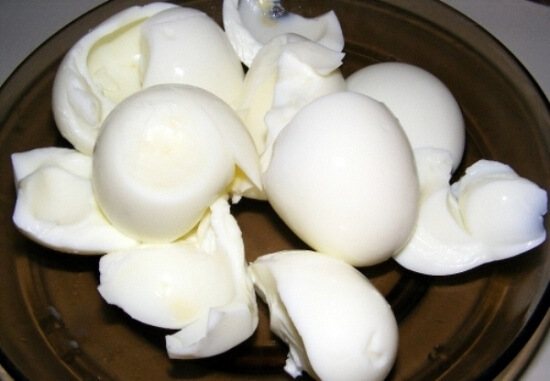
Heat treatment
Let's talk about how much protein is in one boiled chicken egg, fried or raw - we have compiled a small table that will help you understand the issue. Additionally, we added the percentage of protein digestibility, which varies depending on the cooking method. The higher it is, the better!
| Cooking method | Amount of element (grams) | Protein Digestibility Rate (%) |
| Raw | 5,5 | 50-60 |
| Boiled | 5,4 | Soft-boiled – 90, hard-boiled – 98 |
| Roast | 6,6 | 95 |
Now you understand how much protein is in a boiled egg with yolk. This is the healthiest way to cook. By the way, it is best to eat the product for breakfast or lunch; during dinner, avoid such dishes!
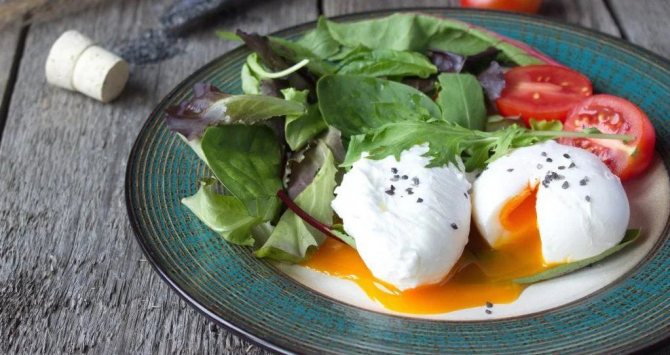
Go ahead? Let's discuss the composition, calorie content and nutritional value of the product.
Benefits and harms
But is it safe to eat chicken eggs? Professional athletes gobble up dozens of them a week, but now we are still talking about mere mortals.
In fact, the harm of egg yolks in terms of cholesterol accumulation has been greatly exaggerated! Moreover, high-density lipoproteins are reduced in the blood of a person who regularly eats eggs. That is, there is no danger to the heart and blood vessels when eating the product.
Another thing is that there is a lot of fat in an egg - several grams. All fats are concentrated in the yolk, which is also digested for at least 3 hours in the stomach. This composition greatly complicates digestion and puts an end to the rest of the diet in matters of weight loss.
But eating whole eggs (along with the yolk) is indicated when gaining muscle mass. The fats contained are needed to increase anabolism in the body and better assimilate the proteins entering it.
Calorie content 1. boiled egg. Chemical composition and nutritional value.
Nutritional value and chemical composition “1. boiled egg."
The table shows the nutritional content (calories, proteins, fats, carbohydrates, vitamins and minerals) per 100 grams of edible portion.
| Nutrient | Quantity | Norm** | % of the norm in 100 g | % of the norm in 100 kcal | 100% normal |
| Calorie content | 158.7 kcal | 1684 kcal | 9.4% | 5.9% | 1061 g |
| Squirrels | 12.828 g | 76 g | 16.9% | 10.6% | 592 g |
| Fats | 11.616 g | 56 g | 20.7% | 13% | 482 g |
| Carbohydrates | 0.707 g | 219 g | 0.3% | 0.2% | 30976 g |
| Water | 74.1 g | 2273 g | 3.3% | 2.1% | 3067 g |
| Ash | 1.01 g | ~ | |||
| Vitamins | |||||
| Vitamin A, RE | 262.6 mcg | 900 mcg | 29.2% | 18.4% | 343 g |
| Retinol | 0.253 mg | ~ | |||
| beta carotene | 0.061 mg | 5 mg | 1.2% | 0.8% | 8197 g |
| Vitamin B1, thiamine | 0.071 mg | 1.5 mg | 4.7% | 3% | 2113 g |
| Vitamin B2, riboflavin | 0.444 mg | 1.8 mg | 24.7% | 15.6% | 405 g |
| Vitamin B4, choline | 253.54 mg | 500 mg | 50.7% | 31.9% | 197 g |
| Vitamin B5, pantothenic | 1.313 mg | 5 mg | 26.3% | 16.6% | 381 g |
| Vitamin B6, pyridoxine | 0.141 mg | 2 mg | 7.1% | 4.5% | 1418 g |
| Vitamin B9, folates | 7.071 mcg | 400 mcg | 1.8% | 1.1% | 5657 g |
| Vitamin B12, cobalamin | 0.525 mcg | 3 mcg | 17.5% | 11% | 571 g |
| Vitamin D, calciferol | 2.222 mcg | 10 mcg | 22.2% | 14% | 450 g |
| Vitamin E, alpha tocopherol, TE | 0.606 mg | 15 mg | 4% | 2.5% | 2475 g |
| Vitamin H, biotin | 20.404 mcg | 50 mcg | 40.8% | 25.7% | 245 g |
| Vitamin K, phylloquinone | 0.3 mcg | 120 mcg | 0.3% | 0.2% | 40000 g |
| Vitamin RR, NE | 2.3214 mg | 20 mg | 11.6% | 7.3% | 862 g |
| Niacin | 0.192 mg | ~ | |||
| Macronutrients | |||||
| Potassium, K | 141.41 mg | 2500 mg | 5.7% | 3.6% | 1768 |
| Calcium, Ca | 55.56 mg | 1000 mg | 5.6% | 3.5% | 1800 g |
| Magnesium, Mg | 12.12 mg | 400 mg | 3% | 1.9% | 3300 g |
| Sodium, Na | 135.35 mg | 1300 mg | 10.4% | 6.6% | 960 g |
| Sera, S | 177.78 mg | 1000 mg | 17.8% | 11.2% | 562 g |
| Phosphorus, P | 193.9 mg | 800 mg | 24.2% | 15.2% | 413 g |
| Chlorine, Cl | 157.58 mg | 2300 mg | 6.9% | 4.3% | 1460 g |
| Microelements | |||||
| Iron, Fe | 2.525 mg | 18 mg | 14% | 8.8% | 713 g |
| Yod, I | 20.2 mcg | 150 mcg | 13.5% | 8.5% | 743 g |
| Cobalt, Co | 10.101 mcg | 10 mcg | 101% | 63.6% | 99 g |
| Manganese, Mn | 0.0293 mg | 2 mg | 1.5% | 0.9% | 6826 g |
| Copper, Cu | 83.84 mcg | 1000 mcg | 8.4% | 5.3% | 1193 g |
| Molybdenum, Mo | 6.061 mcg | 70 mcg | 8.7% | 5.5% | 1155 g |
| Selenium, Se | 32.02 mcg | 55 mcg | 58.2% | 36.7% | 172 g |
| Fluorine, F | 55.56 mcg | 4000 mcg | 1.4% | 0.9% | 7199 g |
| Chromium, Cr | 4.04 mcg | 50 mcg | 8.1% | 5.1% | 1238 g |
| Zinc, Zn | 1.1212 mg | 12 mg | 9.3% | 5.9% | 1070 g |
| Digestible carbohydrates | |||||
| Mono- and disaccharides (sugars) | 0.707 g | max 100 g | |||
| Sterols (sterols) | |||||
| Cholesterol | 575.76 mg | max 300 mg | |||
| Saturated fatty acids | |||||
| Saturated fatty acids | 3 g | max 18.7 g | |||
| Monounsaturated fatty acids | 4.077 g | min 16.8 g | 24.3% | 15.3% | |
| Polyunsaturated fatty acids | 1.414 g | from 11.2 to 20.6 g | 12.6% | 7.9% | |
| Omega-3 fatty acids | 0.078 g | from 0.9 to 3.7 g | 8.7% | 5.5% | |
| Omega-6 fatty acids | 1.337 g | from 4.7 to 16.8 g | 28.4% | 17.9% |
The energy value of 1. boiled egg is 158.7 kcal.
Primary Source: Created in the application by the user. Read more.
** This table shows the average levels of vitamins and minerals for an adult. If you want to know the norms taking into account your gender, age and other factors, then use the “My Healthy Diet” application.

